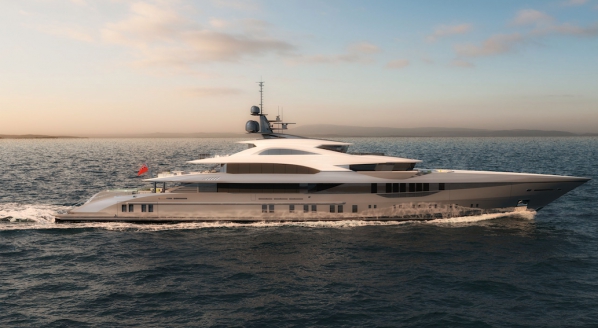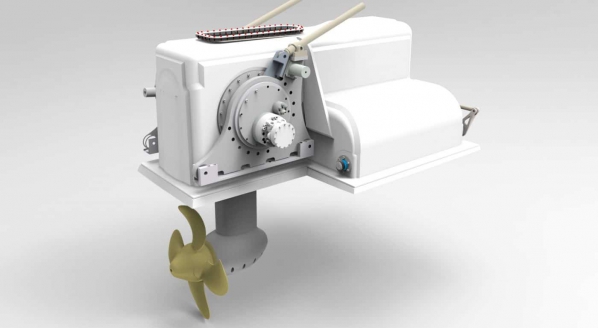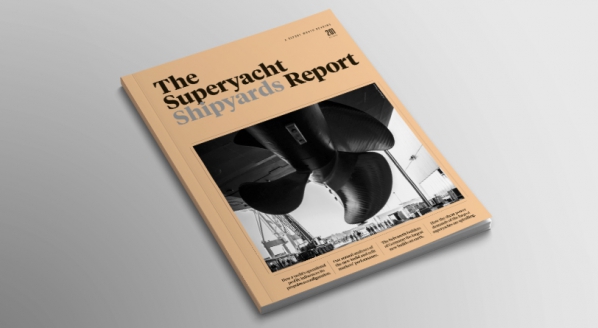Considerations for the future
Where are we in the development of alternative fuels?
Prior to the global health crisis we are now all in the midst of, there had been significant momentum forming in support of a raft of more sustainable measures and decarbonisation effort within yachting, something one would expect to continue to develop across the entire industry, if and when the economic and industrial climate stabilises post the COVID-19 Pandemic.
In the grand scheme of the maritime industry, superyachts are on the cleaner side of things, as Lateral Naval Architects’ principal engineer, Simon Brealey explains, using the example of exhausts. “Across the superyacht industry we actually have amazing filtrations on our exhaust systems. We don’t release particulate matter, because if we did, it would fall on to the deck, which would need cleaning. As an industry, we have universally clean exhausts as it suits our vessels.”
The affect that the IMO sulphur cap, which came into the force at the beginning of 2020, will have on superyachts is minimal, as low-sulphur fuels have been adopted across the industry for quite some time. However, this doesn’t mean that the superyacht industry will slip under the radar, as more stringent environmental efforts and regulations are introduced into the maritime industry, while there is always a need to develop increasingly sustainable options, as the industry becomes more concerned with reducing its footprint.
The use of alternative fuels is of course, one of the subjects at the centre of this, but the question remains, where are we in their development and what would need to happen in order for them to be readily adopted in the superyacht industry?
The use of alternative fuels is of course, one of the subjects at the centre of this, but the question remains, where are we in their development and what would need to happen in order for them to be readily adopted in the superyacht industry?
“The development of alternative fuels in the yacht industry is in the very early stages,” highlights Jon Rysst, senior vice president at DNV GL – Maritime. “Some concepts have been showcased, but the technical feasibility of zero-emission fuel applications has not yet really been proven. Having said this, we do see positive developments underway.”
Mutterings of ‘hydrogen’ can be heard across the superyacht industry, but still as an alternative fuel, this is a slightly controversial, and an oft-misunderstood option at the moment. “The biggest problem with hydrogen is that, to create it, it takes a lot of fossil fuels,” explains Bart Bouwhuis, creative director at Vripack.
“A lot of people don’t know that. You need to have a hydrogen factory, which runs on fossil fuels, and at the moment around 99 per cent of the world’s hydrogen, is all dirty hydrogen,” continues Bouwhuis. “I believe hydrogen is a transition fuel, like also coal was a transition... The ultimate era, I believe, is nuclear, but that will be in 10 to 15 years’ time.”
“It is absolutely realistic [to rely on alternative fuels and hybrid solutions in the superyacht industry], but efforts are needed to prove and evaluate the suitability of the alternatives available. Some owners, designers and yards are looking for more sustainable options and the interest towards such solutions is increasing.”
- Jon Rysst, Senior Vice President, DNV GL – Maritime
So, while there may need to be an emphasis on alternative fuels and their developing viability in the superyacht industry, it is still something that many are looking to develop in the next few years, as Rysst, emphasises. “It is absolutely realistic [to rely on alternative fuels and hybrid solutions in the superyacht industry], but efforts are needed to prove and evaluate the suitability of the alternatives available. Some owners, designers and yards are looking for more sustainable options and the interest towards such solutions is increasing.”
This is also not just a question of fuel. In years to come, the environmental discourse will apply to infrastructure as well as the yachts themselves, as ports and marinas could be looking to invest in eco-solutions via plans to minimise the impact on the environment and the local economy.
Witch yachts entering port and looking for power demands between 200- 450kw, questions have been raised on whether yachts could potentially be limited to shore power as opposed to generators while in port.
“Almost all new yachts are fitted with shore power conversion equipment, which will allow them to match the shore power supply to the voltage and frequency of the ship’s supply,” explains Brealey. “Generally, this equipment is sized to meet a lower capacity than the maximum guest-on-board loading.
“The use of large-scale stored energy - i.e. batteries - can help in providing power for peak energy demands, allowing large yachts to stay on shore power more easily,” he adds. “From a yacht perspective, it is extremely beneficial in terms of the maintenance intervals of machinery, if a yacht can run on shore power.”
“The increased demands on the national grid by having the global fleet connected to shore power when in port would be astronomical and would require a huge increase in power output from power stations.”
- Tony Hildrew, project manager and marine engineer, West Nautical
But at the moment, expecting all yachts to connect to shore power isn’t really feasible and would require ramping up the global infrastructure by some degree. “The increased demands on the national grid by having the global fleet connected to shore power when in port would be astronomical and would require a huge increase in power output from power stations,” says Tony Hildrew, project manager and marine engineer at West Nautical. “I would like to think that the power deficit could be filled by the application of renewable energy sources, but substantial investment would be required to make this happen.”
However, if this was a requirement which was applicable only to the superyacht industry the likelihood is that the power surge would be far more manageable.
“In the coming years, it would be nice to see a fully self-sustainable superyacht marina where the power demands are completely provided by green energy solutions,” adds Hildrew. “A number of land-based companies are now operating using solely green energy for their everyday business so why can’t it happen in the maritime industry?”
So, while questions and queries regarding the future of green technologies in the superyacht industry still stand, it’s clear that hard work and progress is being made, and there are some profound changes emerging on the horizon.
In The Superyacht Propulsion Report , we investigate the increasing power demands of large vessels and the pressure this puts on shoreside infrastructure. click HERE to find a downloadable PDF.
Profile links
NEW: Sign up for SuperyachtNewsweek!
Get the latest weekly news, in-depth reports, intelligence, and strategic insights, delivered directly from The Superyacht Group's editors and market analysts.
Stay at the forefront of the superyacht industry with SuperyachtNewsweek
Click here to become part of The Superyacht Group community, and join us in our mission to make this industry accessible to all, and prosperous for the long-term. We are offering access to the superyacht industry’s most comprehensive and longstanding archive of business-critical information, as well as a comprehensive, real-time superyacht fleet database, for just £10 per month, because we are One Industry with One Mission. Sign up here.
Related news

The Superyacht Propulsion Report
In collaboration with MTU, we analyse the impact of changing emissions regulations on the superyacht industry
Technology

Efficiency and flexibility is key
An increase in global energy demand signals urgent need for eco-friendly power generation
Technology

Propulsion for performance
SuperyachtNews speaks to Baltic Yachts about its innovative retractable propulsion system
Technology

The Superyacht Shipyards Report: out now
The Superyacht Group has focused on the true building blocks of the industry, the shipyards
Business
Related news
The Superyacht Propulsion Report
6 years ago
Efficiency and flexibility is key
6 years ago
Propulsion for performance
6 years ago
The Superyacht Shipyards Report: out now
6 years ago
NEW: Sign up for
SuperyachtNewsweek!
Get the latest weekly news, in-depth reports, intelligence, and strategic insights, delivered directly from The Superyacht Group's editors and market analysts.
Stay at the forefront of the superyacht industry with SuperyachtNewsweek




